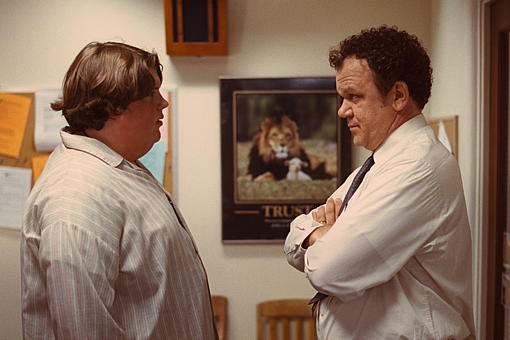By Brock Wilbur · July 11, 2011

I don’t want to talk about Terri.
Somewhat because I just want you to seek out the nearest screening and watch it, but mostly because it’s a borderline painful subject matter for me personally. And while specific issues and roadblocks from the main character’s journey were specific to my life, it’s impossible to not see your own image reflected in the world created by Azazel Jacobs.
Terri (Jacob Wysocki) is an incredibly overweight fifteen-year-old boy, whose apathy and life circumstances have led him to become a personification of the color gray. Nothing is ever happy or sad, just situations that exist. He’s been placed in the care of his Alzheimer’s inflicted uncle (played by The Office’s Creed Bratton) who is controllable when comatose and cruel when aware. Terri’s detachment from society and responsibility has led him to start wearing pajamas to high school, where the kids and a few of the teachers consistently treat him like a monster in their midst. But Terri has come to accept that, because he knows what he is, and has no plans to ever become more.
Following an incident involving cheddar cheese, important documents, and some mild murder, Terri comes in to some trouble for skipping school. This puts him on the radar for Principal Fitzgerald, deftly played by John C. Reilly. He’s borderline cool, borderline effective, and more than a little unconventional. To deal with the Terri issue, he begins counseling the boy in a scheduled Monday morning private session.
This is where the film begins to evolve into a dark (or least stark) re-imagining of The Breakfast Club. It becomes clear to Terri that he’s not the only good-hearted kid in private counseling, and his initial optimism begins to fade when he realizes he’s been selected to join a secret society consisting of the handicapped, the mentally unstable, and the downright weird. Mr. Fitzgerald reveals that his own developmental years involved him being treated as an outcast, and so now he tries to take the neediest of the student body under his wing. This fails to console Terri, who just wishes he didn’t need help.
Jacobs’ film takes its time in setting-up and following through every scene. While it makes for an extended run-time, it also allows for the careful and compelling development of even the smallest moments into weighty and complicated events. This approach is especially successful in helping mold Terri into the kind of character I’ve never seen on film. He isn’t lazy or cruel or stupid, even though his actions can be interpreted as such. He’s just so far outside the world box that his activity has never been judged by others, so while he’s several times larger than all his classmates, he might as well be invisible.
The content of the film is nothing revolutionary, but the aforementioned space that it allows its actors to play in affords for some of my favorite sequences in recent memory. John C. Reilly has to explain a betrayal to Terri, in the form of a monologue that I’m sure will come back to haunt me, thanks to its honesty, perspective, and tangential banality. That scene alone would have made the movie for me, if we didn’t also get an extended third act sequence, which was adorable, brave, and tongue-bitingly infuriating in equal measure. Not to give anything away, but you see a teenage boy become a man the moment he mixes valium with whiskey, takes off his pants, and urinates on them. And that’s just our jumping off point.
It’s a film that’s perfectly personified by its lead: It’s too big, it’s too slow, and it’s for the outcasts (if you have any doubt about that, it features the staple of outcast cinema, Tim Heidecker). But it’s charming in its brutality, honest in its fiction, and life-affirming when it tries hard not to be. The jokes are never laugh out loud funny, but the Novocain-induced atmosphere may leave you smiling numbly throughout. In the best way.